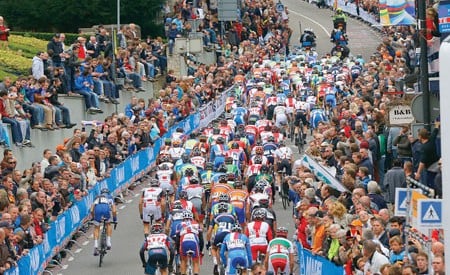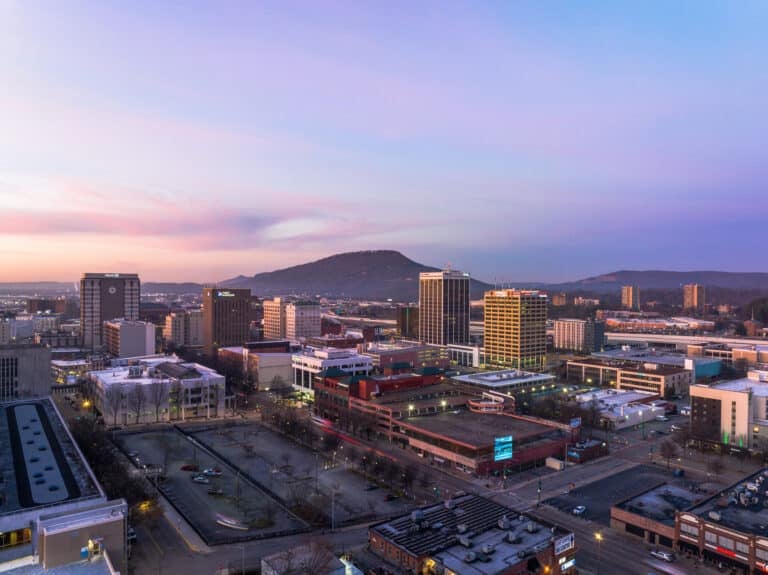Harrisonburg may currently be the heart of Virginia’s mountain biking scene, and Washington D.C. might have the street cred when it comes to bicycle commuting, but Richmond, Virginia is poised to become Virginia’s hub of all things two-wheeled. The city landed the gig to host the 2015 UCI Road World Championships, which gives the best international professional cyclists the chance to compete for their country in front of 450,000 spectators. While the race is sure to shine a light on Richmond’s already hip bike culture, local cyclists are using the event as a catalyst to improve cycling in the region for generations to come, with a series of “legacy projects” designed to turn Richmond into a world-class cycling destination. First up, turning the River City into the South’s greatest IMBA Ride Center.
In July, Governor Bob McDonnell announced the creation of the Richmond Regional Ride Center, a massive project that will improve the 20 miles of existing trail at Pocahontas State Park and create 30 more miles of trail at the park, which is 20 miles from Richmond. Plans are also in the works to improve the already stellar trail system at the James River Park, which sits within the city limits.
IMBA recognizes a dozen Ride Centers across the United States as large-scale mountain bike facilities that include a well-rounded suite of trails, from backcountry to family friendly options. Ride Centers also have a tourism infrastructure geared towards cyclists that includes a welcoming mountain bike community, lodging that caters to cyclists, and bars and restaurants where bikers gather.
“We look at riding facilities within 30 minutes of a town, and the town itself. How does it all tie together?” says Frank Maguire, IMBA’s regional director for the Mid-Atlantic. “The Ride Center concept is based loosely on what you find in Scotland, where trail systems are built around pubs and hotels.”
IMBA rates its Ride Centers with gold, silver, and bronze standards. IMBA gives Harrisonburg a bronze. The town doesn’t have a lot of singletrack within its city limits, but it has excellent backcountry opportunities and an active bike community. Park City, Utah, on the other hand, is the gold standard, largely because of the comprehensive trail system that begins in town and extends into the backcountry.
Richmond already has some of the best in-town singletrack in the country with the James River Park system, and IMBA hopes the improvements to Pocahontas State Park, which include flow trails, a skills course and gateway trails, will elevate Richmond into the top tier of Ride Centers. The goal is to have the first 10 miles of new singletrack built at the park by April 2015, before the world shows up for the Championship races in September. And the Ride Center is only one example of how Richmond is re-branding itself as Virginia’s bike town.
“We’re hoping that the Championship will be a catalyst for other things,” says Lee Kallman, director of communications for Richmond 2015, the mastermind organization behind the World Championships in Richmond. “The idea is that after the race, other bike programs live on. The Ride Center is the first legacy project, and it has nothing to do with road cycling or racing, which I love. It’s about creating trails that are accessible to everyone. We’re also putting a lot of focus on the town’s bike infrastructure. It doesn’t happen overnight, but it can happen quickly.”
While Richmond has an active and hip cycling culture, it doesn’t have a lot of bike lanes or designated paths. Kallman and other local cyclists recently spent a day in Washington D.C., which is renowned for its progressive bike infrastructure that includes miles of car-free trail, bike-friendly rail, and a bike share program.
“Talking to the bike organizations and representatives in D.C. was an eye-opening experience,” Kallman says. “We’re hoping the energy of the 2015 Championships will help spur developments similar to what D.C. has in Richmond. Right now, there are plans to build a bike boulevard that connects parts of the city. Hopefully, if that’s successful, it’ll spur more projects in the future.”
Kallman would also like to see an annual race that uses the same yet-to-be-announced course as the World Championship Road Race. Landing the World Championships has already prompted other races to consider Richmond. The Collegiate National Championships will be held in the city in 2014.
“The World Championships is just the beginning for Richmond,” says Kallman. “It’s about developing bicycling as an economic engine and bringing bikes to the forefront for the city and region.”








